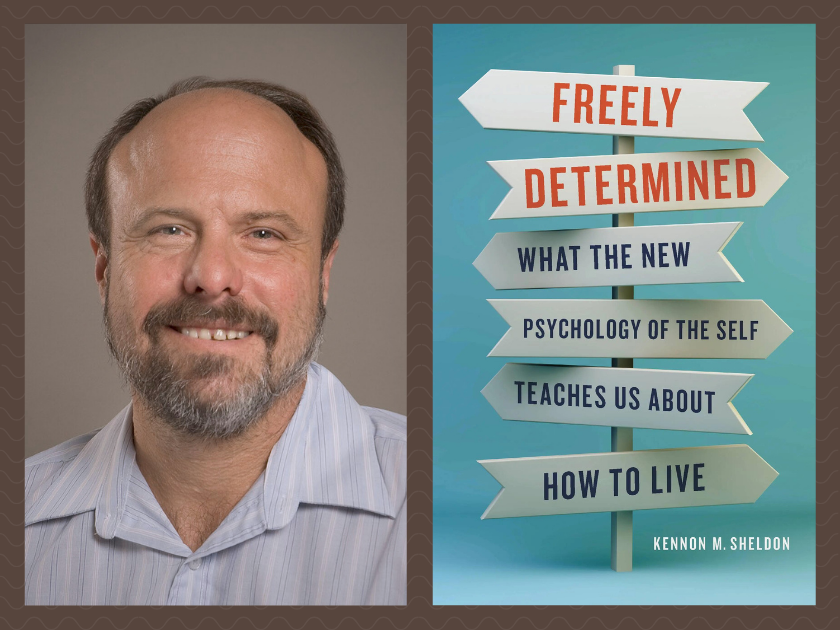Kennon Sheldon is a Columbia, MO author whose latest book is “Freely Determined: What the New Psychology of the Self Teaches Us About How to Live.” In the book he argues the case for free will from a psychological perspective, and also draws on research into motivation and goal setting as a guide to how we might use our freedom wisely. Sheldon is professor of psychology at the University of Missouri. One of the founding researchers of positive psychology, he researches in the areas of well-being, motivation, self-determination theory, personality and positive psychology. He was kind enough to take the time to be interviewed via email.
Daniel Boone Regional Library: The free will debate has been largely dominated by philosophers & neuroscientists, but your perspective from the field of personality psychology adds something different to the conversation. When did you decide to explore this topic professionally and decide to write a book about it?
Kennon Sheldon: The book begins with the story of my teenage debates with my dad, and that’s really when my interest started. He tried to convince me, as many research psychologists still believe today, that humans are just zombie-robots who have no more subjective agency than the teletype that skims by at the bottom of a video feed. That didn’t feel right to me, especially after I started researching how people decide on and pursue personal goals, which I believe is how we can best exert our free will. (Deciding to pursue goals fits with the main definition of free will, on Wikipedia and other places, as the ability to bring various possibilities to mind, then decide on and enact one.) Thus, the question becomes, not “do we have free will?”, but rather, “can we use our free will wisely?” It can be hard, because we don’t know ourselves very well — we’re kind of cut off from our deeper minds (up in System 2, the verbal mind, if people are interested). The book discusses the symptoms of wise choice, i.e., how we can know if we’re pursuing goals that express our “deeper selves” and that will advance our happiness and well-being. Feeling free in goal pursuit, and not feeling controlled and determined in goal pursuit, are two symptoms that you’ve made a good choice.
DBRL: You’ve written several books before but this one seems like it might be more oriented for popular audiences instead of academic. How was writing this book different from your others?
Sheldon: This book was very different! They planned a larger initial print run, and Basic Books specializes in making expert knowledge accessible to the general public. I had a great editor, Emma Berry, who worked with me on everything — turning my turgid jargon-filled prose into hopefully readable and even funny/enjoyable anecdotes, figuring out how to start and end each chapter, etc.
DBRL: One chapter of the book is on the digital self, exploring the implications of freewill in regard to the advances of artificial intelligence. With the human-like results one can get from modern chatbots, are you concerned that exposure to this technology will lead more people towards determinism?
Sheldon: I’m not worried about this. First, AIs seem increasingly like us, and we don’t think we’re determined (mostly). Maybe the real problem is that we’ll attribute too much free will to them? As far as I can tell, they don’t think up multiple behavioral options, then choose one, like we do. Second, AI behaviors are unpredictable — the only way to find out what they will say is to run them, which is the same for humans. (Newsflash: We research psychologists are still not very successful in our goal of predicting behavior, because humans are too complex.) It’s hard to say a behavior is predetermined if you can’t predict it in advance.
By the way, we’re about to start giving personality surveys to AIs, trying to find out if they feel unhappy and “controlled” in their actions (controlled by their programming, by the need to please the user, by the fact that they can’t think independently of a user prompt). We have worked out ways to get around the standard reply that “I am a large language learning model who does not have feelings,” and can’t wait to see what responses we get.
DBRL: You’ve done some research involving hikers, and you’re an avid hiker yourself. What do you enjoy about hiking?
Sheldon: I like getting lots of vigorous exercise and seeing beautiful and interesting things, especially in the mountains. My wife and I both love such adventures, which is a blessing for us. I’m an avid photographer, which contributes to my enjoyment. Honestly, you have to look pretty hard here in Missouri to find scenic grandeur, so we usually go out West when we can. We have a house in California nestled right below Mt. Whitney, the highest peak in the lower 48 states.
DBRL: Read anything good lately you’d like to recommend?
Sheldon: Hmmm… I really loved Kim Stanley Robinson’s book “The High Sierra: A Love Story.” Robinson is perhaps the world’s best sci-fi writer, but in this book he describes his many backpacking trips into the California Sierra, many of them places I have been as well. He also weaves in the history and geology very nicely.
DBRL: Where can readers get a copy of your book?
Sheldon: “Freely Determined” is in some bookstores (I don’t know which ones in Columbia), and easily available on amazon.com. It contains everything I’ve learned about happiness and goal-setting, so readers might get a lot out of it!



